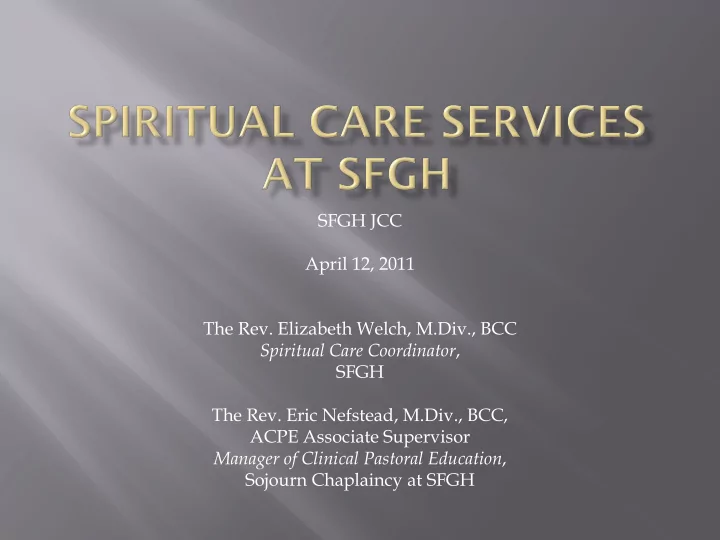

SFGH JCC April 12, 2011 The Rev. Elizabeth Welch, M.Div., BCC Spiritual Care Coordinator , SFGH The Rev. Eric Nefstead, M.Div., BCC, ACPE Associate Supervisor Manager of Clinical Pastoral Education , Sojourn Chaplaincy at SFGH
Review History of Chaplaincy at SFGH Sojourn Multi-faith and Roman Catholic Chaplaincy Spiritual Care Coordinator named in 2008 Present Case Study Address Joint Commission Standards Clarify HIPAA and Spiritual Care at SFGH Volunteer (Community Religious Visitors) Healthcare Provider (Staff Chaplain) Sojourn and SFGH – moving forward
Began in 1982 as HIV/AIDS Ministry Addressed in SFGH Policy 16.15 Signed Memo of Understanding with SFGH Mission is twofold: To provide a nonjudgmental ministry of presence, and spiritual care training, for the broad multicultural mix of patients, their loved ones, the staff of SFGH, and the community. Increase demand; increased care Visits - 2007: 3400; 2011: 10,224 Referrals – January 2008: 19; January 2011: 104
Four staff Executive Director Manager of Clinical Pastoral Education (program a satellite of CPMC’s CPE Program) Training Assistant Administrative Coordinator 30+ Volunteers Board of Overseers—including SFGH Clinical Staff Oversight of Roman Catholic Priest/Chaplain Volunteers and Interns from various traditions Reports to SFGH Spiritual Care Coordinator
Chaplain as member of palliative care team Assessment of patient’s spiritual needs Delivery of Care Reassessment When religious/spiritual concerns impact decisions about care Intervention Supporting patient in addressing spiritual concerns Conclusion
RI.01.01.01 – Rights and Responsibility of the Individual Respects [patient’s] rights ; hospital respects patient’s cultural and personal values, beliefs, and preferences; accommodates patient’s rights to religious and other spiritual services PC. 2.120 – Assessment and Re-assessment Charting is required ; the organization defines, in writing, the scope and content of screening, assessment and reassessment information…including spiritual and cultural variables ; at minimum, a spiritual assessment should define pt’s faith group, beliefs, and what spiritual practices are important to the pt ; For patients who are receiving end-of-life care, the social, spiritual, and cultural values that influence the patient’s and family members perception of grief. (Spiritual Care Coordinator on Palliative Care Team; Policy 16.15) PC.01.02.11 – psychosocial services and substance abuse services include pt’s religion and spiritual beliefs, values, and preferences PC 01.03.01 – Provision of Care, Treatment, and Services Includes interdisciplinary, collaborative, care, treatment, and services; plan based on needs identified by the patient’s assessment, reassessment; based on goals established in patient’s plan of care, staff evaluation the patient’s process; care provided to patient in an interdisciplinary, collaborative manner (Policy 16.15; Member of Palliative Care Team) PI.01.01.01 – Hospital Performance Improvement LD.04.01.05 hospital effectively manages its programs, services, sites, or departments ; oversees operations; defines in writing the responsibilities of those with administrative and clinical direction (Spiritual Care Coordinator job description and develop new policies)
CHAPLAIN AS HEALTHCARE COMMUNITY FAITH GROUP PROVIDER - 160.103 LEADERS – 165.510 Certified clinically- trained professional Employee or volunteer of Employed by healthcare faith group organization Outside visitor w/limited Defined as member of team access to pt information w/access to pt info May document only with Charts interventions oversight by staff and/or through designated policies Qualified by education, of institution training, and experience Sojourn Volunteers including SFGH Spiritual Care CPE Supervisor and various Coordinator Interns
Spiritual Care at SFGH – current practices Assess and address spiritual needs and values affecting care Interpret and attend to multi-faith and multi-cultural influences on clinical services Integrate spiritual care into Palliative Care Services Address spiritual issues related to organ/tissue donation Offer grief and loss care – for patients, loved ones, and staff Provide rituals – at times of birth and death; removal of life support Sojourn Volunteer Chaplain with patient Provide Holiday Observance in chapel and on clinical units
Spiritual Care at SFGH – moving forward Enhance communication with Interdisciplinary teams Improve documentation of spiritual needs and interventions through charting Integrate spiritual care competencies into SFGH policies for staff and volunteers Move toward sustainable model of 24/7 on-call coverage Sojourn Volunteer Chaplain with patient
Sojourn Volunteers SFGH Board Certified Coordinator of Spiritual Care - Valuable Community Partner working with SFGH Sojourn’s ACPE Program - Represent a range of Religious Traditions - Accountable to SFGH Administration - Cost Effective for SFGH - Accountable to SFGH Spiritual Care - Healthcare Provider needed to address JC - Accredited Program adds focus on Coordinator Standards professional competencies - Inconsistent coverage (www.acpe.edu) - Limited continuity of care - Oversight of Volunteers - Varying levels of competency as healthcare - Potential for greater coverage by well- providers w/SFGH patients trained interns and residents - Functions within Code of Professional - Challenged by need for fund-raising Ethics (APC) (www.professionalchaplains.org) - Functions within Code of Professional Ethics (APC and ACPE)
To provide quality healthcare and trauma services with compassion and respect. To provide care that is humanistic, cost- effective and culturally competent
Recommend
More recommend